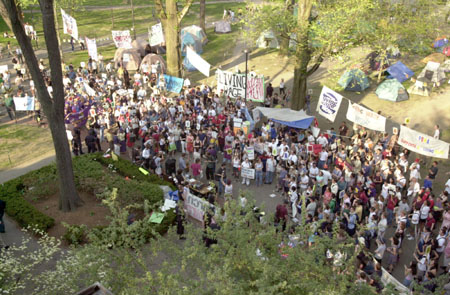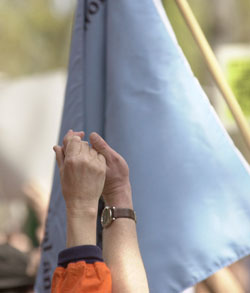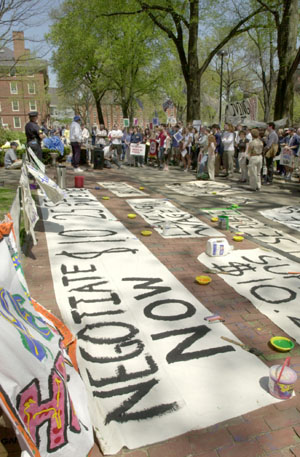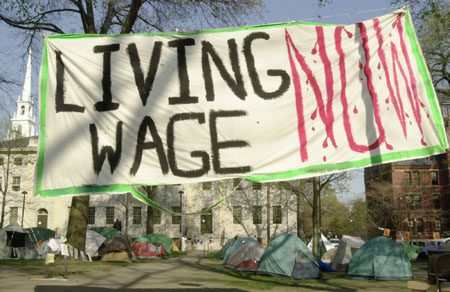New committee to look at welfare of lower-paid workers

President Neil L. Rudenstine has stated his intention to form a new University-wide committee that will further examine issues relating to the economic welfare and opportunities of lower-paid workers at Harvard.
Meanwhile, student protesters from the Progressive Student Labor Movement continued their occupation of much of the first floor of Massachusetts Hall. They are demanding that the University adopt a mandatory minimum wage floor, a so-called “living wage” for all workers at Harvard, whether employed directly by the University or by companies under contract to provide services on campus. The sit-in has been in progress since April 18.
Rudenstine, in a statement to the University community, said he considers the students’ “occupation of a University building, and interference with the activities of other members of the University, [to be] extremely serious actions inconsistent with the fundamental principles of an academic community.”
At the same time, he stressed Harvard’s fundamental commitment to careful study and reasoned discussion of important matters of University-wide concern, and stated his intention to launch a broadly inclusive process to inquire more deeply into the situation of lower-paid workers at Harvard.
The work of the new committee, while informed by the report and recommendations of a faculty-led committee that considered such issues in 1999-2000, would not be limited by the earlier committee’s findings and recommendations, Rudenstine said.
“The students who are engaged in the sit-in have demonstrated their commitment to concerns that are important to all of us,” Rudenstine said. “I appreciate the nature and depth of those concerns, and share a personal commitment to the welfare of all who work at Harvard. At the same time, the path to continuing progress on such important matters is through reasoned discussion and deliberation. I myself am committed to following that path. I hope the students will join me.”

The 1999-2000 committee report recommended new University investments in innovative education and job-skills training programs for service employees, as well as expanded access to health and other benefits. The committee explicitly declined to recommend the adoption of a mandatory wage floor for all workers at Harvard, stating, among other things, that collective bargaining is the appropriate means to set wages for employees represented by unions.
The University’s policies and practices regarding wages, benefits, total compensation, and training opportunities for lower-paid workers would all be open for discussion as part of the new committee process, Rudenstine signaled. So, too, he said, would complex questions regarding the “outsourcing” of on-campus services.
The proposal to launch a thorough re-examination of issues related to the welfare of lower-paid workers drew support in an open letter issued Saturday by Harvard House Masters, who joined Rudenstine in asking the students to leave Massachusetts Hall.
“We, as House Masters, have confidence in the President and the pledges he has made to students and this University community,” the statement said. “We believe the students have brought this phase of their campaign to a successful completion and we urge them to come out of Massachusetts Hall in peaceable fashion, to permit normal lifeto return to the premises, and to allow for the orderly work of the University to resume.”
The text of the letter was read at a special gathering of the members of the Faculty of Arts and Sciences on Friday, at which Rudenstine invited comments and fielded questions about the sit-in, the underlying issues, and the University’s commitment to a further inquiry into the welfare of lower-paid workers.
In another development, a Monday night assault on a security guard in the common room of Straus Hall has heightened administration concerns about security in Harvard Yard.
“The incident, which is not the first, heightens our worries about security within Harvard Yard, and about the increased tension and turbulence that can result especially from the activities of individuals who are not members of the University community,” Harvard College Dean Harry Lewis said in a statement released Tuesday.
Lewis announced Tuesday that persons wishing to enter Harvard Yard from 9 p.m. to 7 a.m. should be prepared to show a Harvard ID.
The guard was assaulted when he approached two men in the Straus Common Room and asked them to identify themselves. One of the men, who was not a Harvard student, threw the guard against a wall, injuring his arm. The guard was subsequently able to subdue one of the two, who was arrested.
Members of the Progressive Student Labor Movement, who began the sit-in April 18 demanding higher wages for Harvard’s lowest-paid workers, expressed concern about the security guard, but characterized the move to control overnight access to the Yard as a “red-herring” aimed at draining support from the protest.
“We were really concerned when we heard a guard was assaulted. We investigated it and as far as we can tell it had nothing to do with us,” said PSLM member Amy Offner.
Reading period looming
Lewis also asked protesters Tuesday to tone down their “noisy” demonstrations no later than the start of reading period on Saturday, so that students living in the Yard can study and sleep without continuing disruption.
“Since the sit-in began, we have been lenient about standard policies regarding amplification, postering and public gatherings in the Yard,” Lewis said. “As reading period approaches, we believe that the overwhelming sentiment of Yard residents is that the right of the PSLM to have its case heard has been given much greater deference and respect than the right of the residents of Massachusetts Hall and nearby buildings to study and to sleep in peace and quiet.”
Offner said the demonstrators have already lowered the volume, restricting loud demonstrations to daily rallies, most of which have been at noon.
The latest demonstration occurred late Wednesday afternoon, when several hundred supporters, including community activists and non-Harvard union members marched down Massachusetts Avenue from Central Square to Harvard Yard to show their support for the student protesters.

On Monday, a noon rally drew nearly 1,000 people to Harvard Yard. Among the speakers was John Sweeney, head of the AFL-CIO. Cambridge Mayor Anthony Galluccio and representatives of the Service Employees International Union, the American Federation of State County and Municipal Employees, and other unions also attended.
Sweeney assured the protesters that they had the support of organized labor. “You are creating hope, hope for a better future for workers all across this country,” he said.
As the hour-long rally broke up, members of the crowd marched around University Hall, chanting and displaying signs, including “String Theorists for a Living Wage.”
Looking forward, Rudenstine said that he is actively consulting with Deans, members of the faculty, and others about the new committee, its membership, its charge, and the necessity for broad outreach across the University community, and that more details will be available in the coming days.





